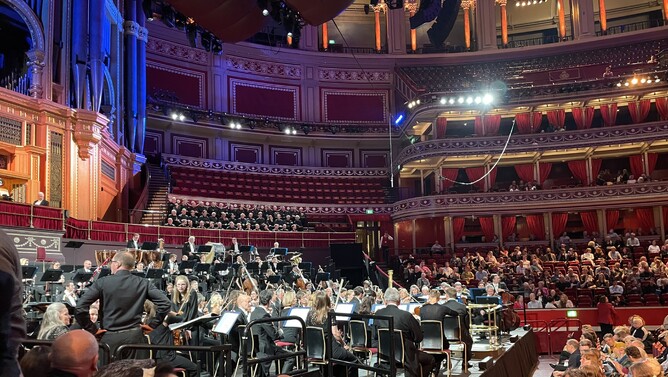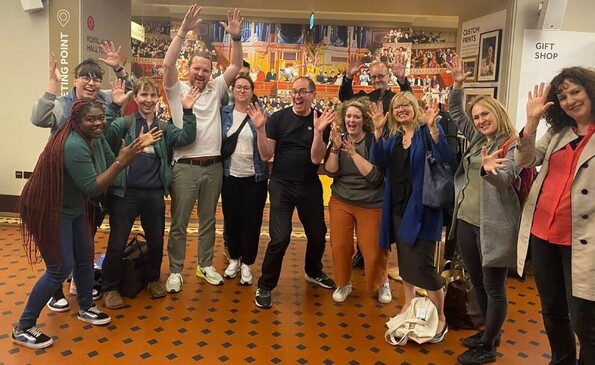The ending of Benjamin Britten’s War Requiem is slow, dignified and very quiet. As the music tapers down, the audience is drawn into the tense, beautiful final bars with the choir singing the ‘Amen’ pianississimo (as quietly as possible). Done well, this ending creates one of those magical moment in a live performance which are followed by an extended shared silence when nobody moves or, it seems, dares to breathe and certainly doesn’t clap. Britten himself specified that at the premier there should be no applause at the end. When you witness a performance, you understand why. The piece leaves you deep in your reflection on war and its impact.
The Royal Philharmonic Orchestra’s performance at the Royal Albert Hall on 26 May date did this ending well. Very well. There was what felt like a whole minute’s silence at the end. The conductor, Vasily Petrenko’s expressive fingers held the silence in the air. And you could feel the significance of this musical protest at war with people contemplating the war tearing apart the lives of people in Ukraine. It was palpable. Then gradually the applause started and became sustained and whole-hearted.
Barriers
I couldn’t hear most of this beautiful piece. But I knew it. I played in three performances of it by the World Orchestra, an international group of young adults designed to help promote understanding, crossing political divides through music. Our performances were in 1989 in West Berlin, East Berlin and Vienna. The conductor was the excellent Jeffrey Tate and the Harlem Boys Choir joined us.
After the West Berlin performance, we had a reception at the Reichstag government building. It was on a high floor of the building. I remember looking out of the window and realising that below I could see the top of the Berlin Wall – and see over it. That perspective brought home to me how surreal the division of that great city was. At that point few people had any idea that in a matter of months, the wall, and divisions would be broken down.
The War Requiem was commissioned for the opening of the new Coventry Cathedral in 1963 – highly symbolic as the English city which suffered most damage during an extreme night of bombing during World War 2. The Requiem draws on a mixture of the Latin liturgy and the poems of Wilfred Owen. It commands an array of players and singers – two orchestras, two choirs (mixed and boys) and 3 solo singers. Visually it is dramatic; musically it is compelling. Britten wrote it so that ‘people might think’.
I travelled from Manchester to London just for the performance, something I have never done before. I am deaf, so why did I do this?
There were 3 main reasons. First the RPO provided interpreting of the Requiem’s words into BSL by deaf musician, Paul Whitaker. While I am not a BSL user, I understand BSL quite well and knew that having someone providing a visual connection to the music would really help. I was also intrigued by how this would work as I had never attended a BSL-interpreted concert before. Second and very importantly, my friend, Liz Varlow – who basically saved me from never playing orchestra music again after I became deaf – would be performing. And third, the thought of experiencing the piece live for the first time since that memorable set of performances in Germany and Austria, was too tempting to ignore. I invested in a score of the music and read it on the train. This triggered my aural memory of when I played it before and whole sections of the piece started to ‘play’ in my head. I used the excellent interpreter whose was precisely in time with the music, plus visual cues, the score and my memory of what ‘should’ sound like to make the most of the experience.
After the performance, one of the friends I went with, Ruth Montgomery, a deaf flautist and founder of Audiovisibility indicated five people signing together on the row behind us. We turned round and joined the conversation. Four of the audience members were Deaf BSL users. None had attended a concert before. They were in raptures over the performance, signing about how much they enjoyed the drama, the atmosphere and the feeling of being drawn into the performance. It was clear that the evening had a powerful impact of them. I asked one of the group whether they would go to another concert and they replied ‘Definitely!’. It was an extraordinary and heartening experience to meet these adults who were being offered access to a musical experience for the first time in their lives. Their enthusiasm and joy at being included were palpable. The person who had suggested the concert, a trainee interpreter related to an orchestra member, deserves huge credit for signposting the event to this group.
The deaf performers, Paul and Liz, met these new audience members in the foyer. It was clear how important it was for them to see these rare role models were working at the very highest level in musical performance. Watching the conversation was extraordinary. It brought home to me, especially as a Board member for the pro-inclusion Arts Marketing Association, why arts and culture organisations must keep working at removing barriers for newcomers and those feeling excluded. Congratulations to the Royal Philharmonic Orchestra for this achievement. I look forward to many more performances which break down barriers and open up the joys of music to more of us.



